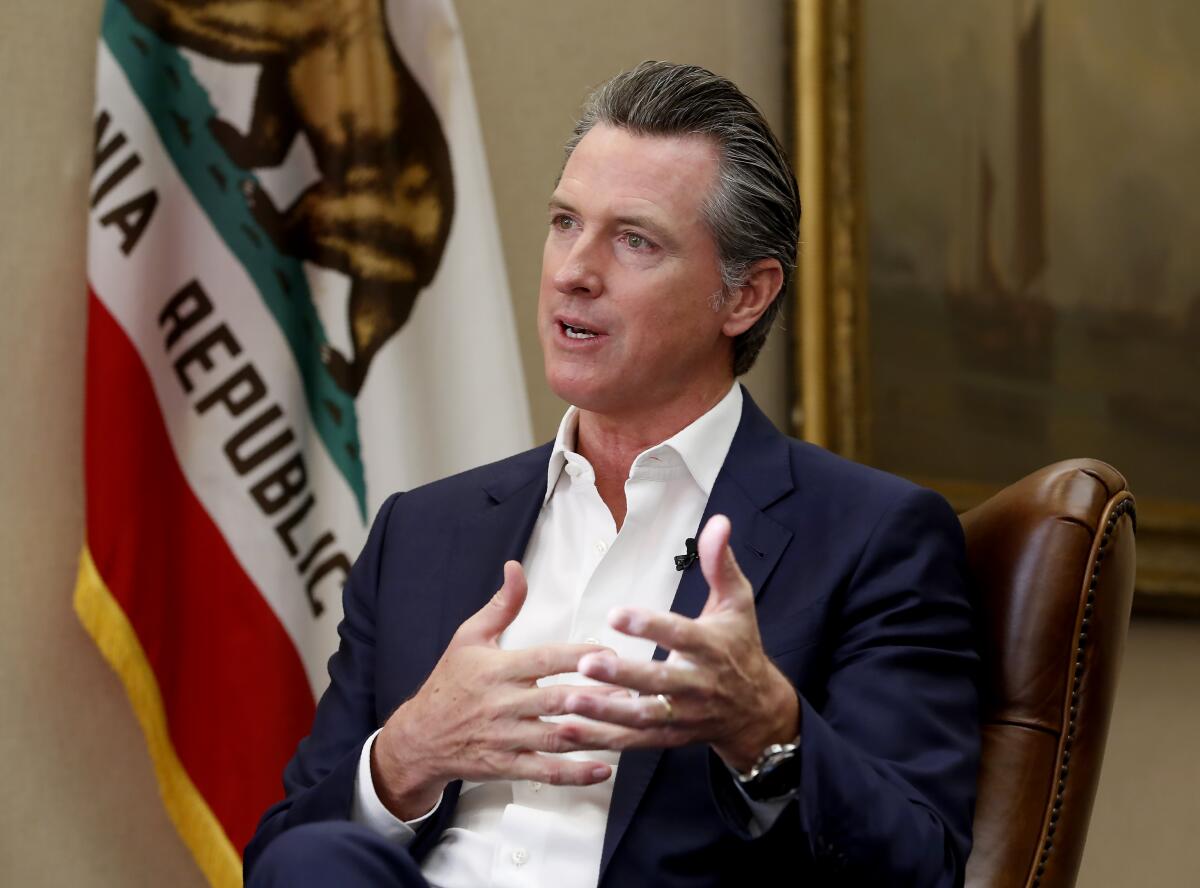Judge halts California law banning forced arbitration at the workplace

- Share via
A California law that would bar job applicants and workers from having to submit to mandatory arbitration as a condition of employment was put on hold Monday by a federal judge in Sacramento little more than a day before it was set to take effect Jan. 1.
U.S. District Judge Kimberly Mueller ruled that the California Chamber of Commerce and other business groups had raised “serious questions” about AB 51, which was signed by Gov. Gavin Newsom following outrage over arbitration agreements that hid allegations of sexual harassment and assault against Hollywood producer Harvey Weinstein and other prominent figures.
Mueller issued a temporary restraining order halting enforcement of the law and set a hearing for Jan. 10 to consider the groups’ motion for a preliminary injunction, which if granted could indefinitely delay its implementation.
The law does not apply to arbitration agreements entered into before Jan. 1 and does not prohibit employers from offering arbitration agreements as a method of settling disputes. However, it seeks to in effect prevent them from being a condition of employment by barring businesses from forcing applicants or employees to “waive any right, forum or procedure” to contest an alleged violation of the California Fair Employment and Housing Act.
Proponents hoped it would push workplace claims out of private, closed-door sessions and bring them into public court proceedings.
The California Chamber of Commerce had labeled the bill one of its “job killers” for the year, saying arbitration is an efficient, fair and more affordable method for companies to resolve disputes. The California chamber joined with the U.S. Chamber of Commerce, as well as the National Retail Federation and other groups, to file suit on Dec. 6. The lawsuit argued the language of the statute violated federal law, as well as U.S. Supreme Court cases that have supported arbitration.
“This statute is just another in a long line where California is trying to essentially get around the Federal Arbitration Act and the many Supreme Court decisions that have enforced it,” said Donald Falk, an attorney at Mayer Brown representing the chambers. “They designed this statute thinking that could escape preemption. The court has more than once said you don’t have to mention arbitration.”
In seeking the restraining order, the business groups said the law would subject employers to “substantial civil enforcement” and criminal penalties. Falk said this is the first state law he knows of that would criminalize the use of mandatory arbitration agreements. “Other states have tried to render them unenforceable. Criminal sanctions have not come into play,” he said.
State Labor Commissioner Lilia Garcia-Brower declined to comment. The offices of Gov. Newsom and California Atty. Gen. Xavier Becerra did not respond to requests for an immediate comment. Garcia-Brower, Becerra and two other state officials are named as defendants.
Concerns over a conflict with federal law twice prompted former Gov. Jerry Brown to veto bills to curb the exploding practice of mandatory arbitration.
However, in the last few years, allegations of sexual harassment and assaults by serial perpetrators, many of whom were protected by arbitration agreements, fueled anger in the #MeToo era. At Google, 20,000 workers staged a global walkout demanding an end to forced arbitration. Other tech workers, including at Los Angeles’ Riot Games, followed suit.
Labor advocates also say arbitration agreements present practical difficulties for employees who might struggle finding an attorney to represent them.
An estimated 67% of California workplaces had mandatory arbitration policies in 2018, higher than the national average, and the number may have grown this year as attorneys advised companies to get ahead of the new law.
In signing AB 51 and a second bill that gives victims of sexual harassment more time to file complaints, Newsom said in October that “everyone should have the ability to feel that pride in what they do, but for too many workers, they aren’t provided the dignity, respect or safety they deserve. These laws will help change that.”
The state has also enacted another law to curb the use of arbitration agreements.
A new activist strategy this year was to file thousands of individual arbitration claims against Uber, Lyft, DoorDash and Postmates, which hit the companies with millions of dollars in arbitration-related fees. Companies used to dealing with employee grievances one by one refused to pay.
A new law, SB 707, imposes stiff penalties on businesses that stall payments beyond 30 days of their due date by allowing workers to skip arbitration and take their grievances to court.
Times staff writer Margot Roosevelt contributed to this report.
More to Read
Inside the business of entertainment
The Wide Shot brings you news, analysis and insights on everything from streaming wars to production — and what it all means for the future.
You may occasionally receive promotional content from the Los Angeles Times.











